Recovery: 13 Minutes 13 Points
 |
About the presenter: Kristin Chmela, M.A. CCC-SLP, Board Recognized Fluency Specialist has treated individuals with fluency disorders for almost 25 years, lectures nationally and internationally, and serves on the Specialty Board on Fluency Disorders. She is Executive Director of Chmela Fluency Center, Inc. and Co-Director of Camp Shout Out. |
13 Minutes, 13 Points
by Kristin Chmela
from Illinois, USA
INSTRUCTIONS: Listen to the audio and follow the pictures below. Then read the text at the end of the pictures. Be patient while the audio loads
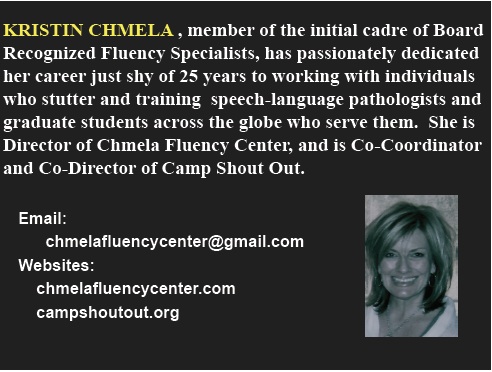 |
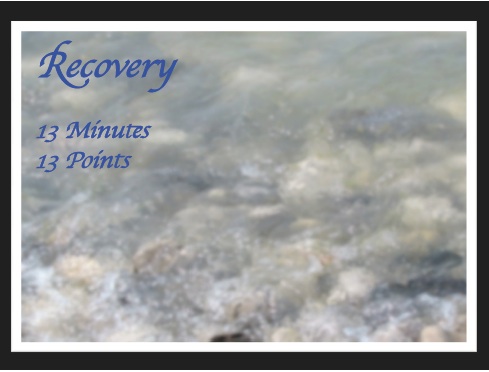 |
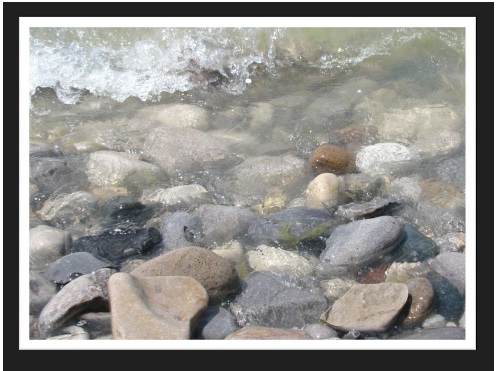 |
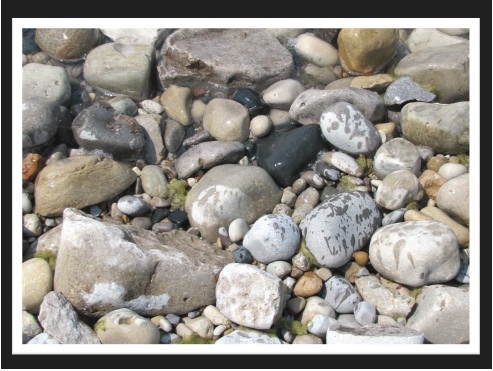 |
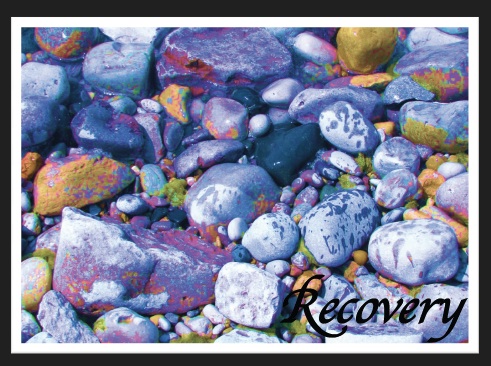 |
Presenting on the recovery panel at the ASHA convention in 2011 was a meaningful experience for me. It was difficult to express in words what had been a lifelong journey. I chose a series of pictures that represented moving from a lack of clarity (rocks blurred by moving water) to greater clarity of self (rocks clearly visible through water) to rocks colored (representing a feeling of peace, joy, and strength).
As a child, I felt a lack of clarity about myself, and why things such as communication, were so difficult for me. I desired to be included as part of the social group, but felt so alone and often isolated. I experienced intense anxiety around communication and endured periods of teasing and bullying that greatly impacted me in ways I did not understand until I became much older.
Clarity about my stuttering and myself increased as a young adult. I worked diligently on my speech. First, my focus was on "not stuttering. " As I became older, my attention was drawn to what I did want, and I looked at communication from a broader perspective, instead of simply considering "stuttering verses being fluent. " I realized what a poor listener I was (always considering past bad experiences or worrying about stuttering) when communicating with other people. I did not feel free as a communicator. Then, I began to gain greatly clarity about my temperament (how I was wired and interacted with my surroundings) and recognized that being a sensitive person was O.K. I felt great freedom from learning these things, as well as learning about other problems I faced (although did not understand until much later) such as coping with anxiety and Tourettes Syndrome.
Throughout my journey of recovery, I continued to place myself in speaking situations that were tremendously challenging. Persistence, a key feature of my temperament, kept me going! Desensitization of fears associated with speaking in front of others was an important focus for many years. It was difficult, but I continued to working towards my "voice as a speech therapist." The desire to "become the best communicator possible" was an important goal. Focusing on aspects of communication, such as eye contact, resisting time pressure, and flexibility with phrasing greatly improved my ability to communicate.
One of the key factors of my recovery has been gaining a greater understanding and sense of clarity about myself. My journey began with a speech therapy experience that set the stage and provided insight into how to become a better communicator. The journey continued with positive influences of many colleagues in our field. In addition, I participated in extensive counseling, including cognitive behavioral therapy. It was not until I was much older that I realized the impact bullying had on my life, and I sought some short term therapy utilized for post traumatic stress (EMDR) that greatly impacted my recovery process. While my initial speech therapy was instrumental in helping me develop and work towards becoming a more effective communicator, the emotional issues associated with stuttering were dealt with over a longer period of time.
Recovery from stuttering for me has been closely tied to deep exploration and acceptance of self. In addition, the desire and efforts towards being a more easy and relaxed speaker have continued. Dealing with a problem so few understand has not been easy. I ended this presentation with a photograph of rocks with added color, which represented clarity and beauty, a sense of awareness and acceptance, feelings of strength and peace. While I consider myself to be recovered as a "person who stutters" I certainly continue to stutter "sometimes." While it was impossible to share the process of recovery in 13 minutes or 13 points, participating in this panel provided a wonderful opportunity to reflect on the journey. I am grateful to have been able to do so.
SUBMITTED: September 3, 2012

